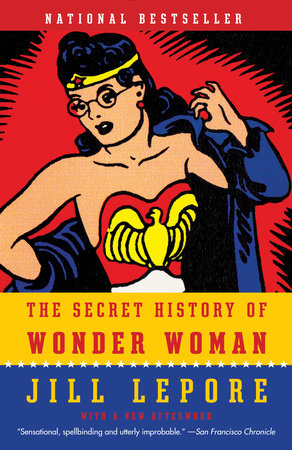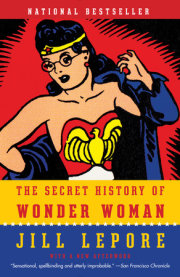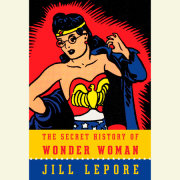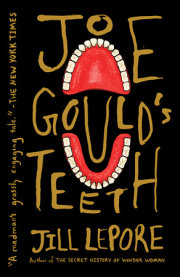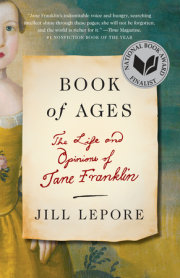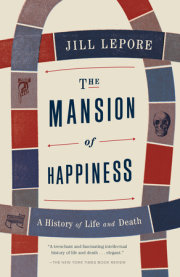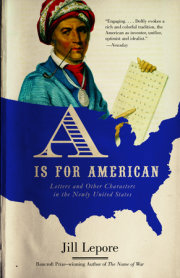Alison Bechdel, author of Fun Home
“The Secret History of Wonder Woman is as racy, as improbable, as awesomely righteous, and as filled with curious devices as an episode of the comic book itself. In the nexus of feminism and popular culture, Jill Lepore has found a revelatory chapter of American history. I will never look at Wonder Woman’s bracelets the same way again.”
Art Spiegelman, author of Maus
“Jill Lepore’s obsessively researched book on Wonder Woman, the four-color embodiment of the women’s rights movement, reveals that the life of the character’s creator, Dr. William Marston—inventor of the lie detector, charming crank, ardent feminist and secret polygamist—was waaay more colorful than any comic book superhero. Suffering Sappho!”
Chris Ware, author of Building Stories
“An absolutely unputdownable book. The life history of polymath charlatan and/or genius (I couldn’t ever decide) William Moulton Marston, who worked his way through law, movie scenarios, lie detection, ménages a trois, free love, BDSM and polygamy before creating the first feminist super-person had me saying ‘wow’ practically every other page. And that’s not even mentioning the tough-as-nails women he exalted, lifted from and, uh, shared who make up the molten core of this newly-revealed story. Rocketing from the suffragism of the 1910s to the ERA of the 1970s on a wave of home-spun pop culture righteousness, this story’s head-spinning weirdness ultimately makes you question your own accomplishments, aims, and—almost like a great modern novel—your real motives.”
Carol Tavris, The Wall Street Journal
“Ms. Lepore’s lively, surprising and occasionally salacious history is far more than the story of a comic strip. The author, a professor of history at Harvard, places Wonder Woman squarely in the story of women’s rights in America—a cycle of rights won, lost and endlessly fought for again. Like many illuminating histories, this one shows how issues we debate today were under contention just as vigorously decades ago, including birth control, sex education, the ways in which women can combine work and family, and the effects of “violent entertainment” on children. “The tragedy of feminism in the twentieth century is the way its history seemed to be forever disappearing,” Ms. Lepore writes. Her superb narrative brings that history vividly into the present, weaving individual lives into the sweeping changes of the century.”
Laura Hudson, Los Angeles Times
“After years of sifting through unpublished letters and diaries, Lepore has written the authoritative work on William Moulton Marston, a Harvard-educated psychologist best known for two things: inventing the lie detector test and creating the world’s most famous superheroine. Lepore’s careful detective work reveals a man of fascinating contradictions….‘The Secret History of Wonder Woman’ is the fullest and most fascinating portrait ever created about the complicated, unconventional family that inspired one of the most enduring feminist icons in pop culture….In [Lepore’s] hands, ‘The Secret History of Wonder Woman’ is its own magic lasso, one that compels history to finally tell the truth about Wonder Woman—and compels the rest of us to behold it.”
Carla Kaplan, New York Times Book Review
“Few historians handle weirdness as deftly or thoughtfully as Lepore….[her] brilliance lies in knowing what to do with the material she has. In her hands, the Wonder Woman story unpacks not only a new cultural history of feminism, but a theory of history as well.”
Etelka Lehoczky, NPR
“The Secret History of Wonder Woman relates a tale so improbable, so juicy, it’ll have you saying, “Merciful Minerva!”… an astonishingly thorough investigation of the man behind the world’s most popular female superhero…. Lepore has assembled a vast trove of images and deploys them cunningly. Besides a hefty full-color section of Wonder Woman art in the middle, there are dozens of black-and-white pictures scattered throughout the text. Many of these are panels from Marston’s comics that mirror events in his own life. Combined with Lepore’s zippy prose, it all makes for a supremely engaging reading experience.”
Audrey Bilger, San Francisco Chronicle
“If it makes your head spin to imagine a skimpily clad pop culture icon as (spoiler alert!) a close relation of feminist birth control advocate Margaret Sanger, then prepare to be dazzled by the truths revealed in historian Jill Lepore’s “The Secret History of Wonder Woman.” The story behind Wonder Woman is sensational, spellbinding and utterly improbable. Her origins lie in the feminism of the early 1900s, and the intertwined dramas that surrounded her creation are the stuff of pulp fiction and tabloid scandal….It took a super-sleuth to uncover the mysteries of this intricate history, hidden from view for more than half a century. With acrobatic research prowess, muscular narrative chops and disarming flashes of humor, Lepore rises to the challenge, bringing to light previously unknown details and deliberately obfuscated connections.”
Dwight Garner, The New York Times
“On the one hand, the story [“The Secret History of Wonder Woman”] relates has more uplift than Wonder Woman’s invisible airplane or her eagle-encrusted red bustier. It’s a yea-saying tale about how this comic book character, created in 1941, remade American feminism and had her roots in the ideas and activism of Margaret Sanger, the founder of Planned Parenthood. On the other hand, “The Secret History of Wonder Woman” is fundamentally a biography of Wonder Woman’s larger-than-life and vaguely creepy male creator, William Moulton Marston…. [Lepore] fully tells Marston’s history for the first time, as well as the complete history of how so many crisp feminist ideas made their way into Wonder Woman comics. It’s complicated material that she capably explores…There are many profitable detours in this book: the history of female cartoonists; the moral panic over comics and juvenile delinquency; a history of the feminist movement.”
Tim Hanley, New York Review of Books
“Lepore specializes in excavating old flashpoints—forgotten or badly misremembered collisions between politics and cultural debates in America’s past. She lays out for our modern sensibility how some event or social problem was fought over by interest groups, reformers, opportunists, and “thought leaders” of the day. The result can look both familiar and disturbing, like our era’s arguments flipped in a funhouse mirror….Besides archives and comics Lepore relies on journalism, notebooks, letters, and traces of memoir left by the principals, as well as interviews with surviving colleagues, children, and extended family. Her discipline is worthy of a first-class detective….Lepore convinces us that we should know more about early feminists whose work Wonder Woman drew on and carried forward….A key spotter of connections, Lepore retrieves a remarkably recognizable feminist through-line, showing us 1920s debates about work-life balance, for example, that sound like something from The Atlantic in the past decade.”
New York Magazine
“Even non-comix nerds (or those too young to remember Lynda Carter) will marvel at Jill Lepore’s deep dive into the real-world origins of the Amazonian superhero with the golden lasso. The fact that a polyamory enthusiast created her partly as a tribute to the reproductive-rights pioneer Margaret Sanger is, somehow, only the fourth or fifth most interesting thing in Ms. Woman’s bizarre background.”
Glen Weldon, Slate
“With a defiantly unhurried ease, Lepore reconstructs the prevailing cultural mood that birthed the idea of Wonder Woman, carefully delineating the conceptual debt the character owes to early-20th-century feminism in general and the birth control movement in particular….Again and again, she distills the figures she writes about into clean, simple, muscular prose, making unequivocal assertions that carry a faint electric charge…[and] attain a transgressive, downright badass swagger.”
Tom Arnold-Forster, Daily Beast
“Lepore has an astonishing story and tells it extremely well. She acts as a sort of lie detector, but proceeds through elegant narrative rather than binary test. Sentences are poised, adverbs rare. Each chapter is carefully shaped. At a time when few are disposed to see history as a branch of literature, Lepore occupies a prominent place in American letters. Her microhistories weave compelling lives into larger stories.”
Melissa Anderson, Newsday
“In the spirited, thoroughly reported "The Secret History of Wonder Woman," Jill Lepore recounts the fascinating details behind the Amazonian princess' origin story….[Lepore] seamlessly shifts from the micro to the macro….A panel depicting this labor unrest is just one of scores that appear throughout Lepore's book, further amplifying the author's vivid prose.”
Ariel Gonzalez, Miami Herald
“A Harvard professor with impeccable scholarly credentials, Lepore treats her subject seriously, as if she is writing the biography of a feminist pioneer like Margaret Sanger, the founder of the birth control movement — which this book is, to an extent….Through extensive research and a careful reading of the Wonder Woman comic books, she argues convincingly that the story of this character is an indelible chapter in the history of women’s rights.”
Colette Bancroft, Tampa Bay Times
“Wonderfully weird….astounding….Lepore is such a lively writer that she sweeps the reader along in this strange tale. It's as much fun as a ride in Wonder Woman's invisible airplane, and just as revealing.”
Kait Calabro, allgeektome.com
“The most intriguing and positively mind-blowing book I have read this year….If you’re looking for a basic history of Wonder Woman then this is not the book for you. This book is way better than anything ‘basic.’ Not only does it give you the background of the development of Wonder Woman, it also documents the period of time and showcases the powerful women that dominated the Women’s Rights movement. This book is way more than just a history book. This book is not just for comic book geeks or feminist, it is for both, and I personally highly suggest you give it a read.”
Nick Romeo, Christian Science Monitor
“Deftly combines biography and cultural history to trace the entwined stories of Marston, Wonder Woman, and 20th-century feminism….Lepore – a professor of American history at Harvard, a New Yorker writer, and the author of “Book of Ages” – is an endlessly energetic and knowledgeable guide to the fascinating backstory of Wonder Woman. She’s particularly skillful at showing the subtle process by which personal details migrate from life into art.”
Elisabeth Donnelly,Flavorwire
“Lepore does a wonderful job….is spry and able as she draws parallels between the comics and the lives of Marston and his “wives.”… a fascinating, wonderfully researched book, and Lepore sheds light on what had been a longtime secret for those in the know.”
Cosmopolitan, 12 New Books All Twentysomething Women Will Be Obsessed With
“Wonder Woman, everyone's favorite female superhero (bulletproof bracelets, hello!), gets the Lasso of Truth treatment in this illuminating biography. Lepore, a Harvard prof and New Yorker writer, delves into the complicated family life of Wonder Woman's creator (who invented the lie detector, BTW), examines the use of bondage in his comics, and highlights the many ways in which the beloved Amazonian princess has come to embody feminism.”
Priya Chhaya, Fangirlblog.com
“The strength of The Secret History of Wonder Woman is that Wonder Woman is embedded in a broader historical context—not just in terms of feminism and equal rights, but also the history of sexuality, psychology, police work, and comic book history–providing readers with a history that is layered and complex….All this being said, the icing on the cake for The Secret History of Wonder Woman are the sketches of the costume in development. Panels from various issues illustrating Wonder Woman’s evolution all add to this engaging and thoughtful book.”
Meredith Maran, Good Housekeeping
“This captivating, sometimes racy, charming illustrated history is one part biography of the character and one part biography of her fascinating creator, psychologist and inventor William Moulton Marston—an early feminist who believed, way before his time, that the world would be a better place if only women were running it….In the process of bringing her ‘superhero’ to life in this very carefully researched, witty secret ‘herstory,’ Lepore herself emerges as a kind of superheroine: a woman on a mission—as energetic, powerful, brilliant and provocative as her subject.”
Jeffrey Ann Goudie, The Kansas City Star
“This book is important, readable scholarship, making the connection between popular culture and the deeper history of the American woman’s fight for equality….Lepore restores Wonder Woman to her rightful and righteous place.”
Elle
“Jill Lepore’s generously illustrated The Secret History of Wonder Woman impressively links the iconic superhero’s 1941 creation by William Moulton Marston (also the inventor of the lie detector) both to the aims of mid-twentieth-century feminism and to the influential Marston family’s deep domestic intrigues.”
Booklist (*starred review*)
“Lepore restores Wonder Woman to her rightful place as an essential women’s rights icon in this dynamically researched and interpreted, spectacularly illustrated, downright astounding work of discovery that injects new zest into the history of feminism.”
Kirkus Reviews
"It's an irresistible story, and the author tells it with relish and delight."
Flavorwire, 25 Must-Read Books for the Fall
“Wonder Woman, feminist hero, was the creation of a husband and wife who led, on the surface, average existences. Behind the mask, however, they had extraordinarily unconventional lives. It takes Harvard professor and New Yorker writer Lepore to dig into the complicated story behind the lasso (of truth), and forgive me for sounding like Upworthy, but it’s true: what she uncovers will shock you. Let’s just say that Wonder Woman’s S&M subtext was there for a reason.”
Library Journal
“An engaging, well-researched look at the unconventional family behind the character and stories of Wonder Woman….Lepore handles her potentially thorny topic well and manages to avoid being salacious or gossipy….Fans interested in the background of the character and readers who appreciate well-written popular history will enjoy this thought-provoking volume.”
Vulture, 8 Books You Need to Read This October
“Relegated to second-class status in her kitschy later years, long overshadowed by her male colleagues in the Justice League, the exiled Amazonian goddess is rescued and recast as the missing link of the feminist movement. She was created by William Moulton Marston: rogue psychologist, inventor of the lie-detector test, and head of a polyamorous household that included the niece of birth-control pioneer Margaret Sanger. In wartime, she was a Rosie the Riveter in actual combat. It’s an origin story far deeper, weirder, and kinkier than anything a cartoonist ever invented.”
Bookforum
“The story of William Moulton Marston, the Harvard-trained psychologist, inventor of the first lie-detector test, and creator of Wonder Woman for DC Comics, is at once inspiring and disheartening. His unlikely career shows us (among other things) that the qualities that make it possible to innovate—swagger, cleverness, tenacity—are the same ones that can render a person hopelessly out of sync with the reigning strictures of the times.”
Alden Mudge, Bookpage
“Fascinating…often brilliant….Through assiduous research (the endnotes comprise almost a third of the book and are often very interesting reading), Lepore unravels a hidden history, and in so doing links her subjects’ lives to some of the most important social movements of the era. It’s a remarkable, thought-provoking achievement.”
Entertainment Weekly
“The Marston family’s story is ripe for psychoanalysis. And so is The Secret History, since it raises interesting questions about what motivates writers to choose the subjects of their books. Having devoted her last work to Jane Franklin Mecom, Benjamin Franklin’s sister, Lepore clearly has a passion for intelligent, opinionated women whose legacies have been overshadowed by the men they love. In her own small way, she’s helping women get the justice they deserve, not unlike her tiara’d counterpart….It has nearly everything you might want in a page-turner: tales of S&M, skeletons in the closet, a believe-it-or-not weirdness in its biographical details, and something else that secretly powers even the most “serious” feminist history—fun.”
Katha Pollitt, The Atlantic
“Hugely entertaining…Lepore calls Wonder Woman the missing link between the first and second waves of feminism, as they’re known—that is, between the suffragist era that so inspired Marston and the 1970s women’s-liberation movement….she’s right that the imagery of waves and troughs overlooks the complicated ways that movements make advances even when no one’s looking—even as daily lives seem stuck and society seems to be moving backwards.”

